Doctor Aileen Souza* was examining a patient at a bustling private hospital in India’s southern state of Tamil Nadu when a senior male colleague approached her from behind and rubbed up against her.
“There was enough space for at least 10 people to queue up behind me. And yet, my senior came and rubbed his d*** against my b*** in public,” Souza, who was 25 when she began her internship at the hospital, tells The Independent.
Born to parents who were doctors and alumni from the same prestigious medical college she attended in the southern city of Vellore, Souza says she entered the profession with a certain sense of security. That illusion was quickly shattered, as she was sexually harassed and assaulted by several colleagues over the years. She says it made her aware of her vulnerabilities as a woman despite the privilege of class, and where it leaves others who are not from similar backgrounds.
Three years after her ordeal she’s speaking out, emboldened by the national outcry over the recent rape and murder of a trainee doctor in the eastern city of Kolkata. More than a million doctors in India went on strike this month amid snowballing protests over the 9 August rape and murder of a resident medic who had settled down for a nap in a lecture hall after working nearly 20 hours of a 36-hour shift at the government-run RG Kar Medical College.
Since then, junior doctors have taken to the streets in protest, demanding justice and better workplace safety for women in hospitals. This comes amid what is being seen as a second wave of the #MeToo movement in India as women actors in a southern film industry speak up about systemic sexual abuse by top professionals, emboldened by a government-appointed fact-finding committee backing their allegations.
The Independent spoke to almost a dozen women doctors about their experiences working in hospitals across India, and all described an environment where sexual harassment is rampant. Their names have been changed to protect their identity in keeping with strict Indian laws that do not allow the victims of sexual crimes to be named.
“I was an intern in the emergency department, assisting a junior consultant when it happened,” Souza says.
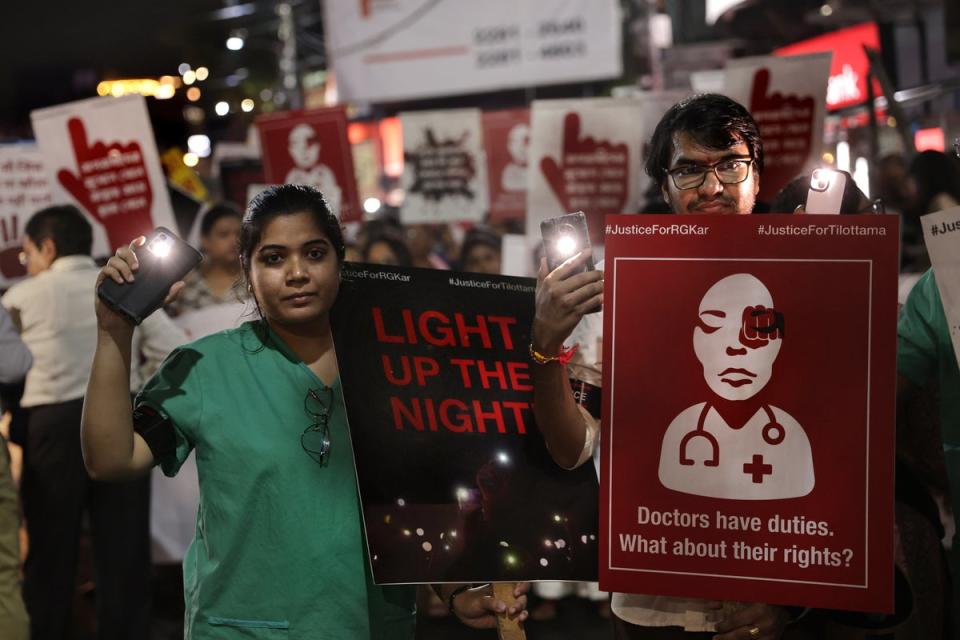

She remembers being frozen in shock at the senior doctor’s inappropriate conduct. “It was clear to everyone present that his actions served no purpose other than to harass me.”
She chose not to speak out at the time, intimidated by the perpetrator’s position of power and the lack of a reliable redressal mechanism. “As a consultant, he could easily damage my reputation and discredit me. I feared he would spread rumours that I was a troublemaker, always complaining and raising allegations.”
Indian laws require all workplaces to have systems in place to address sexual harassment complaints, but a recent analysis by the Udaiti Foundation found that 59 per cent of companies were not compliant. Specific data for hospitals and clinics in India is not publicly available.
“I felt violated and confused, wondering what I had done to encourage this behaviour,” Souza says.
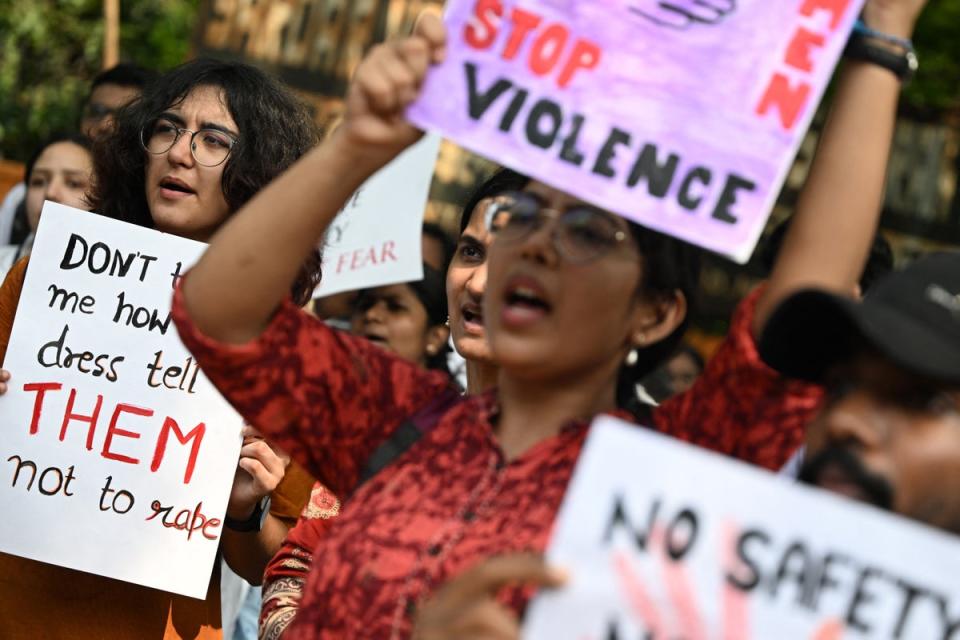

On 20 August, India’s Supreme Court created a hospital safety task force to recommend steps to ensure medical workers’ safety. “If women cannot go to a place of work and be safe, then we are denying them the basic conditions of equality,” said Chief Justice DY Chandrachud.
The court suggested the doctor-led task force consider sweeping reforms to make medical establishments safer for staff, including separate break rooms for female staff, adequate lighting across the campus, CCTV coverage, and the creation of employee panels to conduct quarterly safety audits.
The need for workplace safety for female medical professionals has been reiterated in a letter by the Indian Medical Association (IMA) to prime minister Narendra Modi. “It is for the authorities to provide for the safety of doctors inside hospitals and campuses,’’ it said while listing a set of demands, including assured security and restricted duty hours.
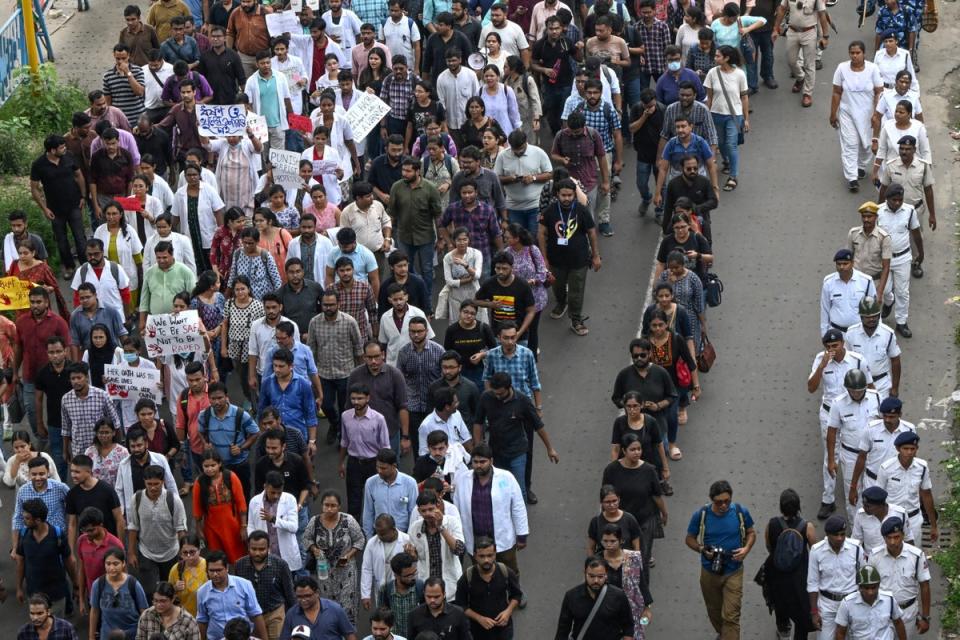

“We appeal to you for your intervention. This will give confidence to not only women doctors but also to every woman in [the] workplace. Sixty per cent of Indian doctors are women. This percentage is as high as 68 per cent in the dental profession, 75 per cent in physiotherapy and 85 per cent in nursing. All healthcare professionals deserve peaceful ambience, safety, and security at the workplace,’’ the IMA said.
Lavanya Biswas, 32, a medical professional from Kolkata, says a senior colleague at a hospital in Vellore in 2017 threatened her with physical assault after she rejected his sexual advances.
She says he started to target her religion after the rejection. “He got quite offended that I have changed my religion … and began to make nasty comments about my faith,” she says.
One day, while she was struggling to take a blood sample from a newborn – a rather difficult procedure – she says he commented, “Oh! where is your Jesus?”
She asked him to keep things “professional” between them but his behaviour continued to worsen. The situation came to a head when they were on night duty together. “Only the two of us were there at night in the ward and we were doing the night rounds, when he asked, ‘Why are you not talking to me?’ I told him that ‘if you keep troubling me, I’m going to complain against you.’”
The senior’s response was menacing. He allegedly responded, “Oh, you want to complain against me? Then I’m going to hit you. So that it’s worth the complaint”.
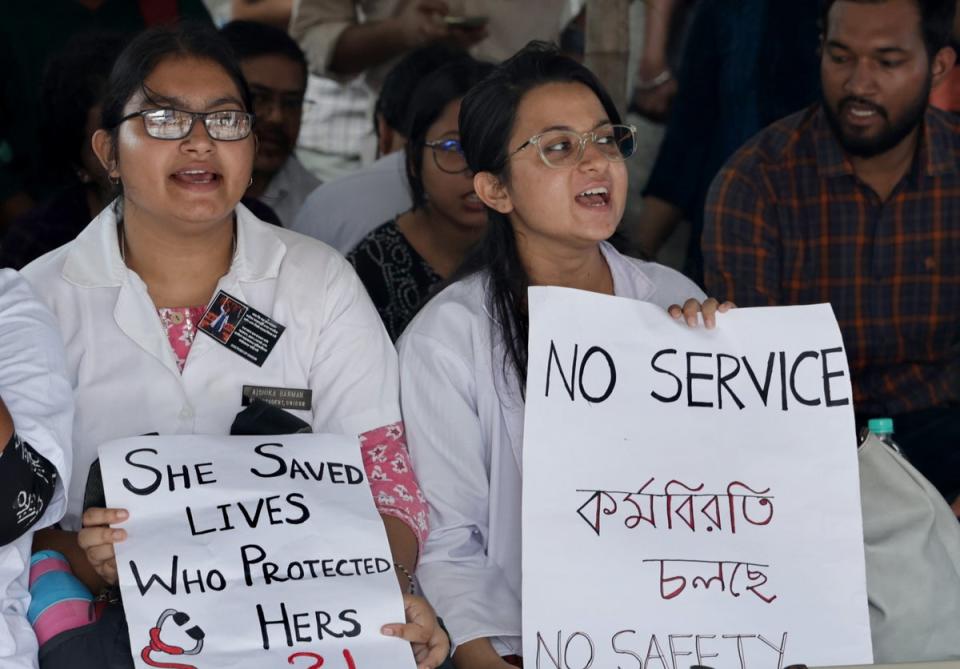

Biswas stood her ground but the experience left her shaken and fearing for her safety.
Today, she regrets not reporting the incident out of the fear of being victim-blamed. “I felt that… I’ll be the one in trouble… The culture is to put everything under the carpet and make everything hush-hush… I already feel cornered… I didn’t want to ruin my tenure and get a bad name.”
Dr Himani Iyer, a 28-year-old resident doctor at Pandit Bhagwat Dayal Sharma Post Graduate Institute of Medical Sciences (PGIMS), Rohtak, narrates a terrifying experience of stalking.
“There was a person with long hair in a red car who started chasing me during Holi,” says the PGIMS student, referring to the Hindu festival of colours traditionally celebrated around March.
After this continued for a while, she asked the hostel guards to stop the car. “That day, the car was stopped outside the boys’ hostel,” says Iyer. But from the next day onwards the driver – a man – started following her from her hostel to her workplace, the pathology department.
The driver also waited for her to finish work, she says. “Since there is free access for everybody inside the campus, it could be anyone,” Iyer says. “Initially it caused me a lot of anxiety. I could not get a hold of myself to take a picture of the car or note the number.
“I did not lodge a complaint and did not know where to seek help. Because going directly to the police did not feel like the first thing I could do,” she says. The police in India routinely accept that minor cases will never work their way through the courts. They instead often mete out their own summary justice, whether that be through mediation or simply beating the suspects and then refusing to register complaints.
Even the most serious and high-profile offences in India take many years to reach a conclusion when taken through the courts. Iyer says that when she finally noted the car’s number and went to the police, they did not file her complaint.
“They were telling me that I should confront my stalker,” she says, which she firmly refused to do.
“I said no, I cannot do that. I’m not from here (the same state). I don’t understand the local ways either. So I would like the police to act. So, they tracked down his number. I think the police had a word with him and after that, it stopped.”
Iyer, who voiced the need for campus safety at a protest organised at PGIMS Rohtak against the Kolkata rape and murder case, says: “It’s not easy to go to the police right away and even though it got sorted out for me, there are younger students, the undergrad people, and going to the police will not be the first thing anybody would think about.”
“If you interact with any of the resident doctors, everybody has a fear inside them. None of the female doctors today want to go out alone. Everybody is trying to be in a group. Even I don’t prefer walking alone after it’s eight or something. I try my best to get a friend [to accompany]me.”
She says many women doctors such as herself are “feeling very unsafe regarding the whole issue” after the Kolkata incident.
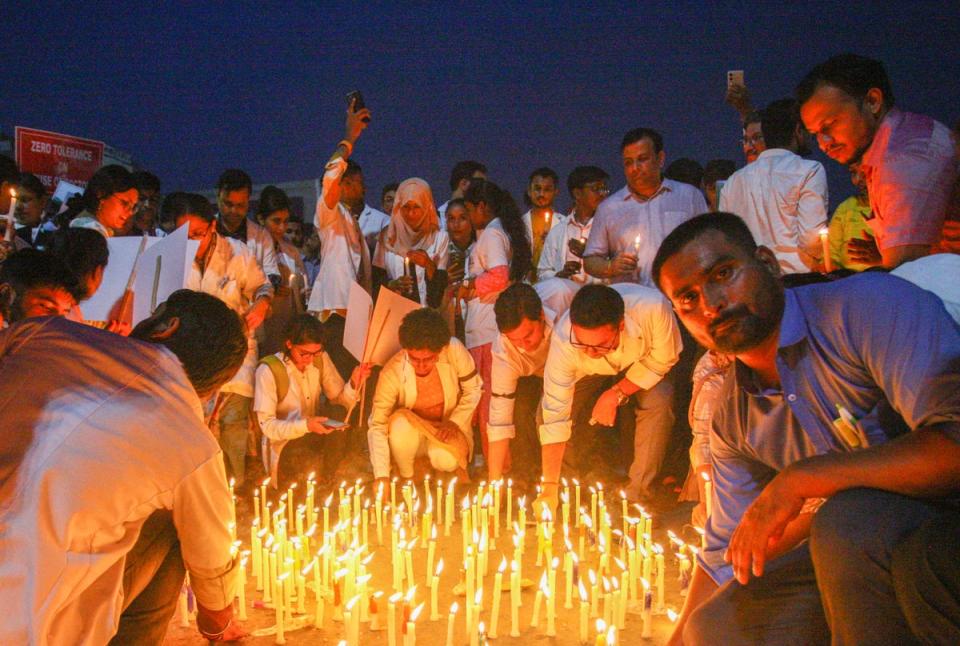

Ananya Kumar, an alumna of PGIMS, Rohtak, says she and her women colleagues were routinely subjected to everyday sexism. There was one incident during an anatomy class around a cadaver that left her shaken, she recalls.
“We were all women, surrounding the table when a professor asked for a pair of gloves. So we asked him if he wanted the 6.5 size – which is a small pair. He said, ‘Ok, give me 6-and-a-half-size gloves only… because it is a different kind of pleasure to put your fingers into small things’ – a horrific innuendo about a woman’s vagina.”
Dr Umesh Yadav, assistant public relations officer at PGIMS, tells The Independent: “I want to assure you on the behalf of PGIMS, we have an institutional committee for these things and that takes these comments very seriously. And let me tell you there has been an expulsion of the faculty member, also on similar grounds, a few years back.”
Dr Yadav refers to the action taken by the institution in August against resident doctor Maninder Kaushik, who was accused of abducting and assaulting a 19-year-old student after she declined his advances.
“In the present case, the university acted suo motu without any official complaint by the student or parents.
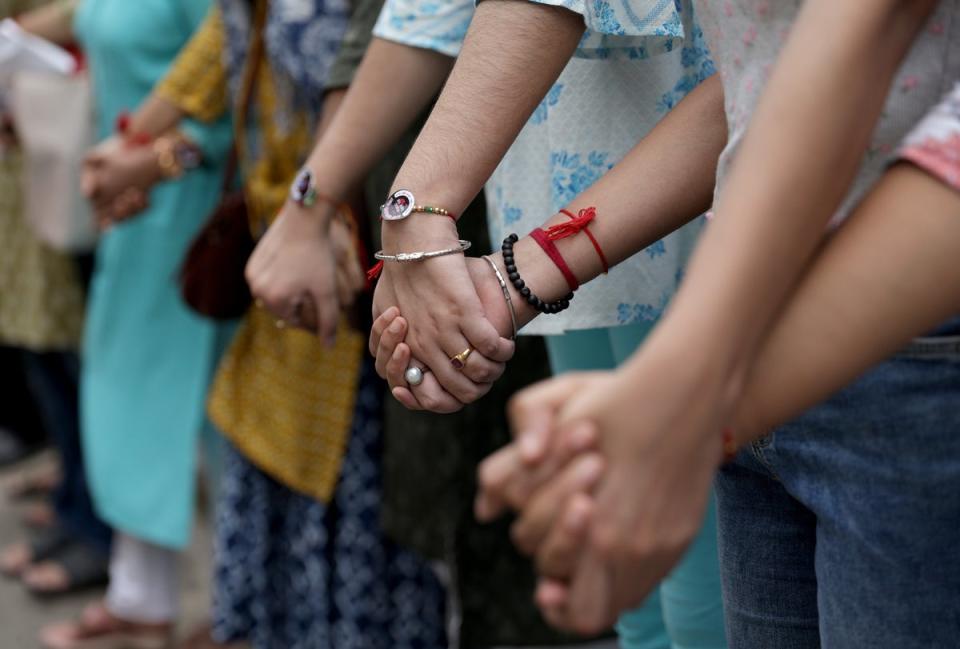

“The student was arrested by the police. Along with that there was expulsion – the maximum that an institution can do – has already been done.” He adds that the campus has sanctioned funds for the installation of CCTV cameras and department heads have been directed to assist students in police complaints in cases of harassment.
Nearly 43 per cent of women experienced non-inclusive behaviour such as harassment or microaggressions and nearly half had concerns about their safety at work, or safety while travelling to work, according to an Economic Times article citing Deloitte’s 2024 Women @ Work report.
Reeza Dey, a 32-year-old doctor, says her estranged father sexually harassed junior employees in the privately-run hospital that he managed alongside her mother.
“They used to hire nurses and lab technicians and I have seen my father harass the people working under him,” she says of incidents going back to 2007, when Dey herself was in her early teens. She recalls nurses complaining that her father would stop them from leaving a room after assisting in a scan.
Though the matter reached her mother, who was also an administrator at the hospital, the resolution was far from fair. “Unfortunately, the whole thing got the twist of infidelity rather than harassment,” shares Dey, adding that it was an “obvious case of workplace harassment”.
“Because she was married to him, she looked at it through the lens of infidelity,” she says of her mother, with whom she is no longer in touch.
“I want to talk about it because the men who harass women are also sometimes our brothers and fathers. I really feel the need to be very vocal about it because I know that people in my family have done this.”
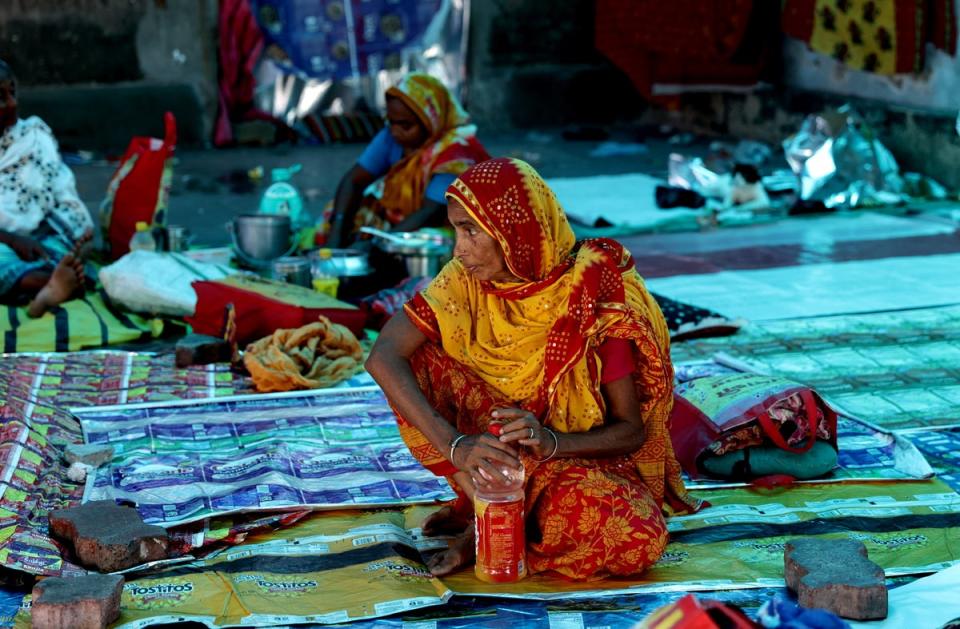

She says her father would “hold” an accountant as she worked on a computer or “put his hand over hers when she was working with the mouse”.
While doctors are vulnerable to violence, Dey says the other workers in the hospital, especially at private clinics, are rarely better off. “If your next paycheck is coming from the owner, then it is not an equal dynamic.”
* All victims names have been changed to protect their identities
